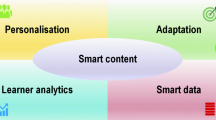Abstract
The learning for children the age With/Post COVID-19 requires ICT-based learning activities. In many countries around the world, computer science education, including programming, is flourishing for children. On the other hand, face-to-face activities have a positive impact on children's independence, however, many activities were restricted. The authors have been studying the development of children's independence, especially, classifying and defining skills required to promote self-directed learning, and developing a learning support system for children. In previous work, a learning-data collection system that collects data regarding the developmental stages and learning activities of children and a feedback system for walk adventure one of the community activities has been developed. However, the feedback system should be revised based on the type of learning activity. In this paper, the authors analyze learning-data collected from students for the design of a feedback system for programming classrooms. Concretely, in the programming classroom, in addition to multiple-choice responses, descriptive responses such as goals and teacher's reflection notes are also recorded. The requirements for the feedback system have been considered based on the calculation of correlation coefficients among the answered choices, and the calculation of word importance based on morphological analysis of the descriptive responses.
Access this chapter
Tax calculation will be finalised at checkout
Purchases are for personal use only
Similar content being viewed by others
References
Ministry of Education: Culture, Sports, Science and Technology (MEXT): Programming Education at the Elementary School Level (Summary of Discussion), http://www.mext.go.jp/b_menu/shingi/chousa/shotou/122/attach/1372525.htm Accessed 31 May 2020. (in Japanese)
Shibuya, K.: Programming Education in Elementary School Integrated Learning Time, Miraino Manabi Consortium. https://miraino-manabi.jp/content/260 Accessed 31 May 2020. (in Japanese)
Kawano, Y., Kawano, Y.: Consideration of the e-learning System for Children to Promote Proactive Learning, JSiSE Technical Report (March 2019). (in Japanese)
Kawano, Y., Kawano, Y.: Development of Learning Data Gathering System and Analysis of Learning Data in a Programming Classroom for Children, JSiSE Technical Report (March 2020). (in Japanese)
Kawano, Y., Kawano, Y.: A Proposal of Children Learning System to Promote Self-directed Choosing of Learning Tasks and Analysis of Learning Data in a Programming Classroom. In: The 23rd International Conference on Network-Based Information Systems (NBiS-2020). Victoria, Canada (August 2020)
Kawano, Y., Kawano, Y.: Development of learning systems for children to promote self-directed choosing of learning tasks. Int. J. Mobile Comp. Multime. Comm. (IJMCMC) 12(3), 60–77 (July 2021)
Toyoda, M.: Report on considerations for promoting programming class at elementary school. Graduate School of Teacher Education Wakayama University bulletin of Course Specializing in Professional Development in Education 2, 83–90 (2017). (in Japanese)
Ministry of Education: Culture, Sports, Science and Technology (MEXT): Characteristics of each stage of a child's development and issues to focus on. https://www.mext.go.jp/b_menu/shingi/chousa/shotou/053/gaiyou/attach/1286156.htm. Accessed 10 Feb 2020. (in Japanese)
Iio, J.: TWtrends - a visualization system on topic maps extracted from twitter trends. IADIS International Journal on WWW/Internet 17(2), 104–118 (2019)
Acknowledgements
This work was supported by the JSPS [grant no. JP19K02982].
Author information
Authors and Affiliations
Corresponding author
Editor information
Editors and Affiliations
Rights and permissions
Copyright information
© 2022 The Author(s), under exclusive license to Springer Nature Switzerland AG
About this paper
Cite this paper
Kawano, Y., Goto, Y., Kawano, Y. (2022). Analysis of Learning-Data for Feedback System in Programming Classrooms. In: Barolli, L., Miwa, H., Enokido, T. (eds) Advances in Network-Based Information Systems. NBiS 2022. Lecture Notes in Networks and Systems, vol 526. Springer, Cham. https://doi.org/10.1007/978-3-031-14314-4_50
Download citation
DOI: https://doi.org/10.1007/978-3-031-14314-4_50
Published:
Publisher Name: Springer, Cham
Print ISBN: 978-3-031-14313-7
Online ISBN: 978-3-031-14314-4
eBook Packages: Intelligent Technologies and RoboticsIntelligent Technologies and Robotics (R0)




